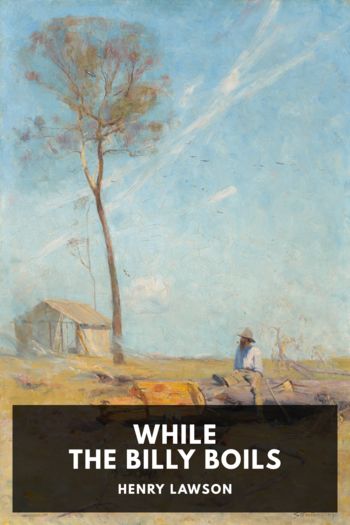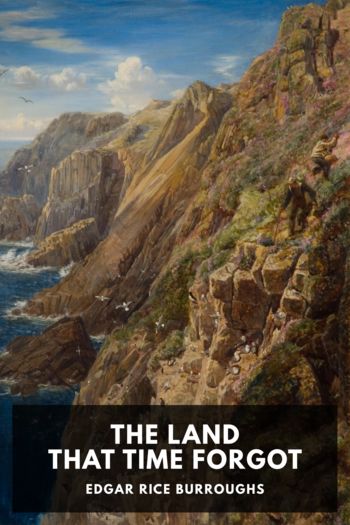While the Billy Boils, Henry Lawson [hardest books to read .txt] 📗

- Author: Henry Lawson
Book online «While the Billy Boils, Henry Lawson [hardest books to read .txt] 📗». Author Henry Lawson
And for months after that you cannot get rid of the idea that that half-sov. might be about your clothes somewhere. It haunts you. You turn your pockets out, and feel the lining of your coat and vest inch by inch, and examine your letter papers—everything you happen to have had in your pocket that day—over and over again, and by and by you peer in envelopes and unfold papers that you didn’t have in your pocket at all, but might have had. And when the novelty of the first search has worn off, and the fit takes you, you make another search. Even after many months have passed away, some day—or night—when you are hard up for tobacco and a drink, you suddenly think of that late lamented half-sov., and are moved by adverse circumstances to look through your old clothes in a sort of forlorn hope, or to give good luck a sort of chance to surprise you—the only chance that you can give it.
By the way, seven-and-six of that half-quid should have gone to the landlord of the hotel where we stayed last, and somehow, in spite of this enlightened age, the loss of it seemed a judgment; and seeing that the boat was old and primitive, and there was every sign of a three days’ sou’-easter, we sincerely hoped that judgment was complete—that supreme wrath had been appeased by the fine of ten bob without adding any Jonah business to it.
This reminds us that we once found a lost half-sovereign in the bowl of a spare pipe six months after it was lost. We wish it had stayed there and turned up tonight. But, although when you are in great danger—say, adrift in an open boat—tales of providential escapes and rescues may interest and comfort you, you can’t get any comfort out of anecdotes concerning the turning up of lost quids when you have just lost one yourself. All you want is to find it.
It bothers you even not to be able to account for a bob. You always like to know that you have had something for your money, if only a long beer. You would sooner know that you fooled your money away on a spree, and made yourself sick than lost it out of an extra hole in your pocket, and kept well.
We left Wellington with a feeling of pained regret, a fellow-wanderer by our side telling us how he had once lost “fi-pun-note”—and about two-thirds of the city unemployed on the wharf looking for that half-sovereign. Well, we hope that some poor devil found it; although, to tell the truth, we would then have by far preferred to have found it ourselves.
A sailor said that the Moa was a good sea-boat, and, although she was small and old, he was never afraid of her. He’d sooner travel in her than in some of those big cheap ocean liners with more sand in them than iron or steel—You, know the rest. Further on, in a conversation concerning the age of these coasters, he said that they’d last fully thirty years if well painted and looked after. He said that this one was seldom painted, and never painted properly; and then, seemingly in direct contradiction to his previously expressed confidence in the safety and seaworthiness of the Moa, he said that he could poke a stick through her anywhere. We asked him not to do it.
It came on to splash, and we went below to reflect, and search once more for that half-sovereign. The cabin was small and close, and dimly lighted, and evil smelling, and shaped like the butt end of a coffin. It might not have smelt so bad if we hadn’t lost that half-sovereign. There was a party of those gipsy-like Assyrians—two families apparently—the women and children lying very sick about the lower bunks; and a big, good-humoured-looking young Maori propped between the end of the table and the wall, playing a concertina. The sick people were too sick, and the concertina seemed too much in sympathy with them, and the lost half-quid haunted us more than ever down there; so we started to climb out.
The first thing that struck us was the jagged top edge of that iron hood-like arrangement over the gangway. The top half only of the scuttle was open. There was nothing to be seen except a fog of spray and a Newfoundland dog seasick under the lee of something. The next thing that struck us was a tub of salt water, which came like a cannon ball and broke against the hood affair, and spattered on deck like a crockery shop. We climbed down again backwards, and sat on the floor with emphasis, in consequence of stepping down a last step that wasn’t there, and cracked the back of our heads against the edge of the table. The Maori helped us up, and we had a drink with him at the expense of one of the half-casers mentioned in the beginning of this sketch. Then the Maori shouted, then we, then the Maori again, then we again; and then we thought, “Dash it, what’s a half-sovereign? We’ll fall on our feet all right.”
We went up Queen Charlotte’s Sound, a long crooked arm of the sea between big, rugged, black-looking hills. There was a sort of lighthouse down near the entrance, and they said an old Maori woman kept it. There were some whitish things on the sides of the hills, which we at first took for cattle, and then





Comments (0)